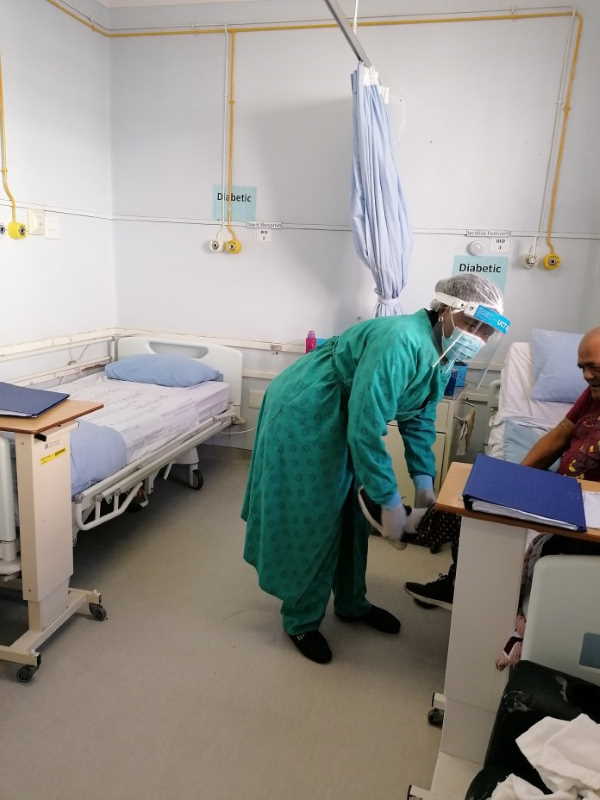Thursday 4th February is World Cancer Day. Amidst the current challenging circumstances, hospices around South Africa continue to care for thousands of cancer patients. During the ongoing Covid-19 pandemic, cancer has taken somewhat of a back seat to the virus which continues to dominate the local and global media landscape, but cancer still remains one of the biggest killers in our nation.
According to Ewa Skowronska, the CEO of the Hospice Palliative Care Association (HPCA): “Cancer patients make up around 20% of the total patients that hospices work with. According to our detailed tracking system, as of the end of 2020, 6,446 people were being assisted post-cancer diagnoses in 43 hospices,” says Skowronska. ““As an indication of how prolific cancer cases are; we have 50 different types of cancers being tracked on our systems. There are also those who have either TB or HIV as well as cancer that are receiving care.”
Hospice treatment comprises of pain management, holistic palliative care, family and patient support and end-of-life care.
Says Skowronska: “Families and patients often don’t know that they can, and should, expect holistic support when they are facing life-threatening diseases of any kind. Palliative care trained health workers offer specialist support in areas such as pain and symptom management, communication with families, spiritual support and bereavement counselling.”
HPCA’s 103 member hospices across South Africa, who care for patients with a variety of life-threatening diseases, predominantly in the comfort of their own homes, implemented strict Standard Operating Protocols (SOP) early in the Covid-19 pandemic outbreak to protect the highly vulnerable patients that they care for. Throughout the pandemic, many patients continue to undergo their cancer treatment despite having to negotiate the challenging hurdles of overburdened hospital systems with limited capacity.
Says Tersia Burger, CEO of the Stepping Stones hospice: “Some patients that ran into treatment “side effects” were treated at our hospice as hospitals had bed availability issues. As patients were too scared to go to doctors, have X-rays and biopsies during the initial Covid-19 outbreak, we definitely have patients who fell through the cracks due to fear. By the time these patients eventually did see a doctor, it was too late. For cancer patients, while we enforced barrier nursing, we did sometimes bend the “no visitor” rule with deep cleaning processes implemented. As our cancer patients are often immune compromised, this was incredibly important, but we did not want to deprive immediate family of being with a dying loved one.”
According to Zodwa Sithole of CANSA: “‘Given the effects of Covid-19 on health systems worldwide, it’s unfortunately expected that this pandemic will have a substantial impact on cancer outcomes. Lessons learnt should become an integral part of the new normal of health care. The integration of cancer care as a part of the institutional emergency preparedness plan will improve patient outcomes in similar crises. Another challenge is the wellbeing and state of mind for many cancer patients at this time who are still cautious and afraid to go for treatment and hence worried about the lack of treatment and possible spreading of existing cancer – this can negatively impact cancer patients. This is of concern to CANSA as we promote early detection and regular screening. We know that early detection is key to enabling effective treatment and a better chance of recovering from or facilitating remission from cancer. As CANSA, we can help with our free confidential, professional, cancer-related telephonic counselling to cancer patients, caregivers and their families and parents or guardians of children living with cancer. Counselling is available in seven languages (English, Afrikaans, isiXhosa, isiZulu, siSwati, Sesotho and Setswana).”.
Ashika Soorju, of Kwazulu-Natal, whose father was diagnosed with a very rare and aggressive type of bladder cancer last year says: “When you get a diagnosis, like my dad, he still felt fine and didn’t feel that he needed hospice. But people need to understand that the engagement should happen early on. Hospice staff have an element of humanity that is different to hospital environments. The detailed explanations of what my father’s body was undergoing gave him dignity and made it so much easier for us to understand and to appropriately assist. There is so much that the patient and the family don’t know or understand. In this current pandemic, with the lack of hospital beds, I had to assist my Dad with very physical things such as bladder irrigation and it’s so important to have support and a care team, who is literally on call. With a cancer diagnosis, so many patient choices are taken away and the ultimate dignity was to be able to offer him choices; led by the extremely experienced hospice team. I am so grateful because 90% of the time my father was pain-free. What hospices do cannot be explained, it has to be experienced. They are an organisation that you want to support and be a part of.”
Concludes Skowronska: “Cancer continues, with or without a pandemic, and as the HPCA, we urge all those that are diagnosed, and their families, to reach out to hospices and not to live in fear.”












